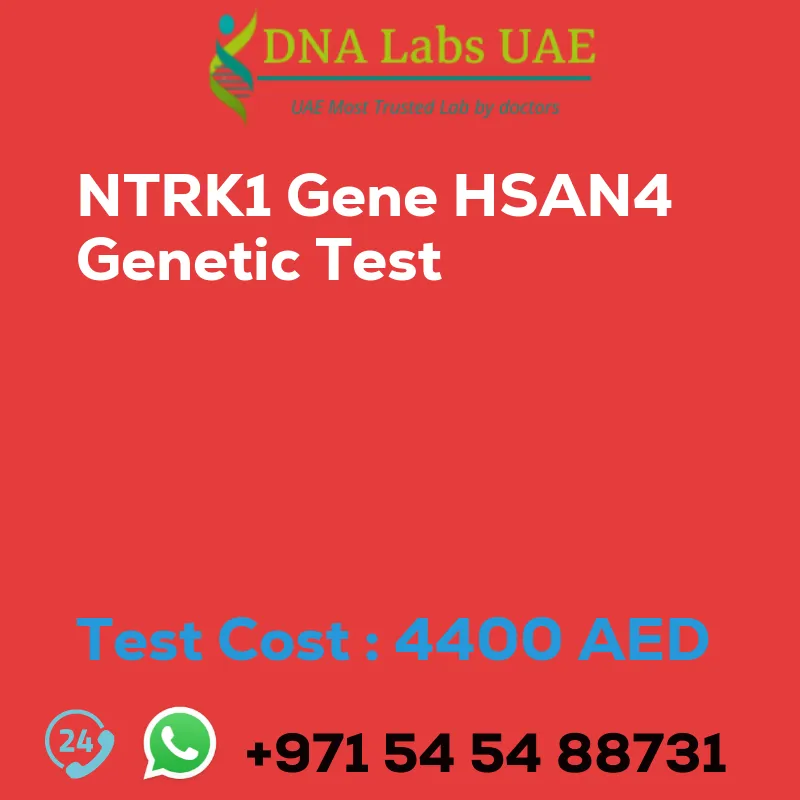NTRK1 Gene HSAN4 Genetic Test
Welcome to DNA Labs UAE, your trusted genetic testing lab. In this blog post, we will discuss the NTRK1 Gene HSAN4 Genetic Test, including its cost, symptoms, diagnosis process, and more.
Test Name: NTRK1 Gene HSAN4 Genetic Test
- Components: NGS Technology
- Price: 4400.0 AED
- Sample Condition: Blood or Extracted DNA or One drop Blood on FTA Card
- Report Delivery: 3 to 4 Weeks
- Test Type: Neurological Disorders
- Doctor: Neurologist
- Test Department: Genetics
- Pre Test Information: Clinical History of Patient who is going for NTRK1 Gene HSAN4 NGS Genetic DNA Test. A Genetic Counselling session to draw a pedigree chart of family members affected with NTRK1 Gene HSAN4.
About NTRK1 Gene HSAN4 Genetic Test
The NTRK1 gene is associated with a condition called hereditary sensory and autonomic neuropathy type IV (HSAN4). HSAN4 is a rare genetic disorder characterized by the progressive loss of sensation and autonomic dysfunction.
NGS (Next-Generation Sequencing) genetic testing is a method used to analyze the DNA sequence of an individual’s genes. It allows for the simultaneous analysis of multiple genes or even the entire genome. In the case of HSAN4, NGS genetic testing can be used to identify mutations or variations in the NTRK1 gene that may be responsible for the condition.
NGS testing involves obtaining a DNA sample from the individual, usually through a blood sample or a cheek swab. The DNA is then sequenced using advanced technologies, and the resulting data is analyzed to identify any genetic variations or mutations. By identifying specific mutations in the NTRK1 gene, NGS testing can provide a definitive diagnosis for HSAN4.
This information is important for understanding the underlying cause of the condition, predicting disease progression, and potentially guiding treatment options.
At DNA Labs UAE, we are committed to providing accurate and reliable genetic testing services. Our team of expert geneticists and neurologists ensure that you receive the highest quality care and support throughout the testing process.
If you suspect that you or a loved one may have HSAN4 or any other neurological disorder, we recommend consulting with a neurologist and considering the NTRK1 Gene HSAN4 Genetic Test. Early diagnosis and intervention can make a significant difference in managing the condition and improving quality of life.
Contact DNA Labs UAE today to schedule your NTRK1 Gene HSAN4 Genetic Test and take a step towards understanding your genetic health.
| Test Name | NTRK1 Gene HSAN4 Genetic Test |
|---|---|
| Components | |
| Price | 4400.0 AED |
| Sample Condition | Blood or Extracted DNA or One drop Blood on FTA Card o |
| Report Delivery | 3 to 4 Weeks |
| Method | NGS Technology |
| Test type | Neurological Disorders |
| Doctor | Neurologist |
| Test Department: | Genetics |
| Pre Test Information | Clinical History of Patient who is going for NTRK1 Gene HSAN4 NGS Genetic DNA Test A Genetic Counselling session to draw a pedigree chart of family members affected with NTRK1 Gene HSAN4 |
| Test Details |
The NTRK1 gene is associated with a condition called hereditary sensory and autonomic neuropathy type IV (HSAN4). HSAN4 is a rare genetic disorder characterized by the progressive loss of sensation and autonomic dysfunction. NGS (Next-Generation Sequencing) genetic testing is a method used to analyze the DNA sequence of an individual’s genes. It allows for the simultaneous analysis of multiple genes or even the entire genome. In the case of HSAN4, NGS genetic testing can be used to identify mutations or variations in the NTRK1 gene that may be responsible for the condition. NGS testing involves obtaining a DNA sample from the individual, usually through a blood sample or a cheek swab. The DNA is then sequenced using advanced technologies, and the resulting data is analyzed to identify any genetic variations or mutations. By identifying specific mutations in the NTRK1 gene, NGS testing can provide a definitive diagnosis for HSAN4. This information is important for understanding the underlying cause of the condition, predicting disease progression, and potentially guiding treatment options. |








